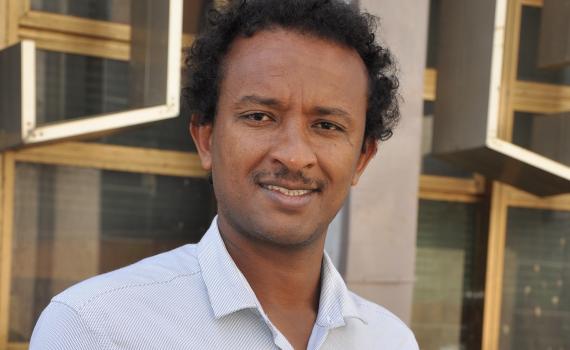In September, Ethiopia adopted a national open access policy for higher education institutions. In a guest blog on the EIFL website, Dr Solomon Mekonnen Tekle, librarian at Addis Ababa University Library, organiser of the Open Knowledge Ethiopia group and EIFL Open Access Coordinator in Ethiopia, celebrates the adoption of the policy. This is a repost of the original blog at EIFL (Electronic Information for Libraries) – a not-for-profit organization that works with libraries to enable access to knowledge in developing and transition economy countries in Africa, Asia Pacific, Europe and Latin America.
The new national open access policy adopted by the Ministry of Science and Higher Education of Ethiopia (MOSHE) will transform research and education in our country. The policy comes into effect immediately. It mandates open access to all published articles, theses, dissertations and data resulting from publicly-funded research conducted by staff and students at universities that are run by the Ministry – that is over 47 universities located across Ethiopia.
In addition to mandating open access to publications and data, the new policy encourages open science practices by including ‘openness’ as one of the criteria for assessment and evaluation of research proposals. All researchers who receive public funding must submit their Data Management Plans to research offices and to university libraries for approval, to confirm that data will be handled according to international FAIR data principles. (FAIR data are data that meet standards of Findability, Accessibility, Interoperability and Reusabililty.)

We will have to adapt quickly!
Our universities and libraries will have to adapt quickly to comply with the new policy. Each university will have to develop an open access policy to suit its own institutional context, and which is also aligned with the national policy. We have a long way to go – at present, only three of the 47 universities that fall under the Ministry (Hawassa, Jimma and Arba Minch universities) have adopted open access policies.
The policy requires universities to ensure that all publications based on publicly-funded research are deposited in the National Academic Digital Repository of Ethiopia (NADRE) as well as in an institutional repository, if the university has one. NADRE is supported by MOSHE, and also harvests and aggregates deposits from institutional repositories.
Right now, about 13 universities under the Ministry have institutional repositories, but only four are openly available because of policy and technical issues, so there is work to be done.
Ministry support for universities
To speed up and support compliance with the new policy, MOSHE has launched a project in partnership with Addis Ababa University.
I am managing the project, and I am very happy to have the support of the Consortium of Ethiopian Academic and Research Libraries (CEARL) through its chairperson, Dr Melkamu Beyene, who has been named chairperson of the project board. We can also draw on the expertise and experience of Iryna Kuchma, Manager of the EIFL Open Access Programme, who serves as an international advisor for the project.
The project has just started. It will ensure that all public universities that do not have institutional repositories establish them as soon as possible. The project will also strengthen the Ethiopian Journals Online (EJOL) open access journals platform that currently includes 24 journals and is hosted by Addis Ababa University. And the project will support researchers in making their research available through the EthERNet platform for research data, and through NADRE.
There is a strong capacity building component to the project to train repository managers and administrators to manage their new institutional repositories and open access journals.
Positive impact of the new policy
When we first began making research outputs openly available in Ethiopia there was fierce resistance from the academic community who were worried that their work would be plagiarized. But now, researchers and students come to my office in the library and ask for their research to be published in open access so that others, like potential employers, for example, can find and read it. They see the benefits.
The main impact of the new policy will be to increase the visibility of Ethiopian research, within the national and international research communities. The quality of our research will improve, because researchers will be able to see and verify each others’ work, and to comment on the integrity of the methodology and results. Practitioners in organizations will have access to our research and will be able to base their work on it and so our research will have real impact. Sharing of research and data through open access will minimize duplication, thereby saving costs, time and effort.
The journey to achieving the new policy was long. We began reaching out to MOSHE over three years ago, and they formed a Working Group to draft a national open access policy based on a model that had been developed by CEARL and Addis Ababa University, with support from EIFL. Success resulted from a collective effort by many colleagues and partners. I am proud to have been part of the process and I am now looking forward to working with our partners to achieve full implementation of the policy through the Ministry’s project.
Solomon Mekonnen is an Academic Staff with rank of Lecturer and Open Access Coordinator at the Addis Ababa University (AAU). Apart from his role at AAU, He is also a Co-Founder of Code4Ethiopia which advocates for open data in Ethiopia. In addition, Solomon coordinates nationally Open Access Programme of international network called Electronic Information for Libraries (EIFL) representing Consortium of Ethiopian Academic and Research Libraries. He is also a local organizer in Ethiopia for international network called Open Knowledge. As part of his role as local organizer, he coordinates the Open Knowledge community in Ethiopia focusing on open data and open science.








